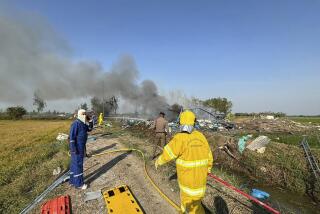Backdrop of Bangkok bombing: A country sliding into dictatorship
Leena Jang is surrounded by soap. Every box — and there are thousands of them — bears her face and name. They cover almost every surface in her small TV studio, stacked precariously on equipment and packed into cardboard boxes beneath overflowing shelves.
Jang, a fiery 56-year-old with heavy makeup and purple-streaked hair, is a trained lawyer, beauty product entrepreneur and well-known media pundit, like a Thai cross between Rush Limbaugh and YouTube cosmetics star Michelle Phan.
Between infomercials, she delivers antigovernment screeds vitriolic enough to make the hardiest dissidents blanch — or laugh uncomfortably. On air, she has called Thailand’s constitution “backwards,” its government “crap,” and a former prime minister “dumb as a buffalo.”
The diminutive critic’s outspokenness has made powerful enemies for her. The Thai military, which took power in a coup last year, has threatened her with exile, arrest and physical violence. It shut down her satellite TV show, “HotTV,” and blocked her YouTube channel. She now posts her videos on Facebook.
But without her much larger television audience, she says, the inventory has been collecting dust. It is a constant reminder of her frustration.
“Other channels just bow to the military,” she says. “They have a lot to lose — their advertisers might pull out. I really have nothing. I have no husband, no son, no daughter. I have my back against the wall. All I really have is my heart.”
NEWSLETTER: Get the day’s top headlines from Times Editor Davan Maharaj >>
Since the military toppled a democratically elected government on May 22, 2014, ending months of street protests, experts say that Thailand — once widely considered a beacon of liberal democracy in Southeast Asia — has been sliding toward dictatorship, replete with tightened restrictions on freedom of expression, assembly and the press.
The government — called the National Council for Peace and Order — has criminalized protests involving more than five people and threatened to shut down dissenting media. Although Bangkok has remained largely calm in recent months, a bomb exploded Monday night at the Erawan Shrine, a popular tourist attraction in the central city, killing at least 18 people and injuring more than 100.
The explosion occurred near the Rajprasong intersection, the site of the protests last year that compelled the junta to take power. No one immediately claimed responsibility. “We are not sure if it is politically motivated, but they aim to harm our economy and we will hunt them down,” Deputy Prime Minister Prawit Wongsuwon told reporters, according to the Associated Press.
The prime minister, former army chief Gen. Prayut Chan-o-cha, has burnished a reputation as an eccentric strongman. In September, Prayut told an audience that he once covered himself from head to toe in holy water to ward off curses from opponents. In December, he threw a banana peel at a cameraman. He has demanded that journalists kneel before him. In March, when asked what he’d do with reporters who “didn’t tell the truth,” he quipped, “We’ll probably just execute them.”
Under Prayut, 61, the junta has detained activists for the slightest acts of dissent, including raising three-fingered “Hunger Games” salutes, reading out loud from the anti-authoritarian novel “1984,” and in the case of one lunchtime gathering, “eating sandwiches with political intent.”
“The country is so desperate,” said Sunai Phasuk, a Bangkok-based senior researcher at Human Rights Watch. He said that Prayut’s restrictions on freedom of expression and assembly have muted most moderate criticism, creating an environment where only the most radical voices remain.
“He’s mercurial — he himself is a ranter,” Sunai said. “He wants Thailand to be rebuilt in his image … you can end up in jail for disagreeing with him.”
In April, Prayut replaced martial law with a sweeping security decree granting the junta extralegal power to crack down on “acts deemed harmful to national peace and stability.” Local media have called the rule, Article 44 of an interim constitution, “the dictator law.”
Chuwit Kamolvisit, a Bangkok politician and former massage parlor tycoon known for disclosing endemic bribery within the city’s police department, said that the junta has repeatedly warned him not to criticize Prayut in interviews with local journalists.
“We cannot argue against someone who controls both the law and the gun,” he said. “Even though we wish we could argue with Gen. Prayut, we have to nod our heads and say, ‘I understand.’ Everybody you see here, they smile. They seem very nice. And when you ask, they say, ‘I’m OK, I’m OK, I’m OK.’ But inside, they’re not OK.”
Prayut has repeatedly said that he has no intention of clinging to power. Yet critics say that he has taken steps to solidify his rule, such as prosecuting political opponents and appointing a military-heavy Cabinet and parliament, which declared him prime minister a year ago. He has repeatedly delayed general elections, most recently to 2016.
All of this is playing out against the backdrop of extraordinarily sensitive royal succession: The country’s widely revered 87-year-old King Bhumibhol Adulyadej has reportedly fallen ill. Prayut is known as a staunch monarchist, analysts say, and may not step down until the succession issues are resolved.
Thailand has experienced 12 coups — and seven attempted coups — since it became a constitutional democracy in 1932. The country has been deeply divided for years, primarily along economic lines, and despite a facade of normality in the capital, tension simmers.
“Society has become so divided,” said Nuttakarn Sumon, 37, the director of a modeling agency in Bangkok. “If you’re upper middle-class, and you’re not a farmer or a taxi driver, part of you might feel really against” the government’s detractors, she said. “Some of them prefer the dictatorship; they think it’s better than having protests.”
Noodle stall owner Kraisri Puppachat, 43, blamed the junta for a protracted economic slump, and said he would protest if it wouldn’t result in jail time. His revenue has dropped 40% over the last year, he said, forcing him to open the stall earlier and lay off employees. “Everybody blames the government,” he said. “But they can’t do anything, because they’re afraid.”
“This dictatorship is going to stick around for longer than most people think,” said Aim Sinpeng, an expert on Thai politics. She said that Prayut’s initiatives have a broad, cultural bent. He has pushed to install “12 core values of the Thai people” in the primary school curricula, including “love for the nation,” “respect for the law and elders,” and “concern for the public good over self-interest.” The junta has issued orders requiring that schoolchildren recite them in class.
“The regime feels that part of the problem why Thailand is in such a mess — why it’s had protests for the past 10 years — is that we’ve forgotten what it’s like to be Thais,” Aim said. “These kinds of things shape society in ways that don’t allow a lot of room for resistance.”
Prayut and other officials have justified the restrictions as necessary to mend the country’s divisions.
“Right now we can say that we need to rebuild our country, rebuild our society,” said Maj. Gen. Werachon Sukondhapatipak, a deputy government spokesman. “We need to bring back harmony. And to do that, we need to reconcile people from all sectors. So we need to stop the flow of toxic information, which leads to the divisions in society.”
Jang herself has shown signs of buckling under pressure. She recently accepted a new job anchoring an entertainment program on Bright TV, a digital network. She says she will continue her political broadcasts, but her demanding schedule will not allow her to post as much as she would like.
“There won’t be any politics” in the new job, she said. “I’m not too excited about it. It’s just something to pay the bills.”
Follow @JRKaiman on Twitter for news from Asia
ALSO:
Oscar Pistorius prosecutors file appeal four days before his expected release
U.S. boosts support role in Saudi-led airstrikes on Yemen
Kurd youths in Turkey arm themselves with firebombs, guns and pickaxes
More to Read
Start your day right
Sign up for Essential California for news, features and recommendations from the L.A. Times and beyond in your inbox six days a week.
You may occasionally receive promotional content from the Los Angeles Times.






